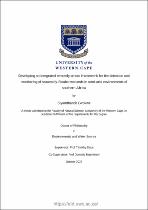| dc.description.abstract | Wetlands are among the most important ecosystems on earth; they cover approximately 4-6% of the earth’s surface and offer critical eco-hydrological services. However, these ecosystems are under threat from anthropogenic activities, droughts and climate variability, as well as from global environmental change. It is estimated that over 60% of the world’s wetlands have been lost due to climate change and variability, as well as other anthropogenic influences. There is, therefore, a need for their routine monitoring and assessment to ensure the sustainable use and management of these systems on a national, regional and local scale, and prevent their further degradation and loss. This study aimed at developing an integrated cloud-computing-based, remotely-sensed framework for the detection and monitoring of small and seasonally-flooded wetlands along the semi-arid Limpopo Transboundary River Basin of southern Africa, which was previously a challenging task when using the traditional assessment and monitoring methods. | en_US |

